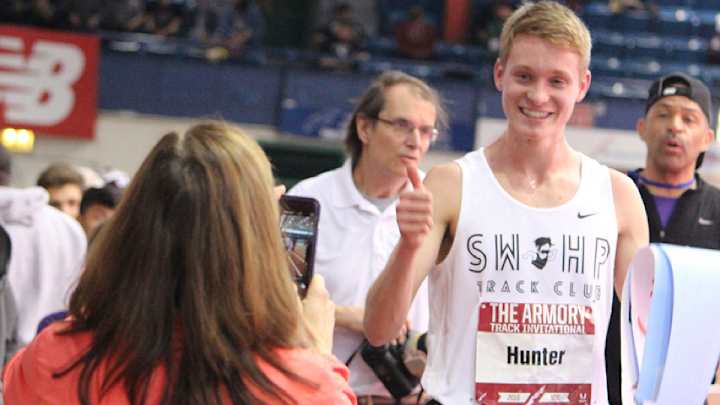High school star runner Drew Hunter turns professional, signs with adidas

EUGENE, Ore. — When Loudoun Valley senior Drew Hunter ran 3:58.25 to break Alan Webb’s 3:59.86 high school indoor mile record from 2001, fans in Eugene, Ore. were giddy for the Oregon commit to arrive next fall. But when an opportunity presented itself for Hunter to turn professional, he decided to forego his NCAA eligibility and sign a long-term professional contract with adidas, making him the first high school male distance runner to turn professional.
The monetary terms of the deal were not disclosed, but SI has learned it is a 10-year deal and adidas will pay for Hunter's education at his university of choice. Previous high school milers prodigies have run at collegiate level for a short period before turning professional. Jim Ryun attended Kansas for four years and Webb attended Michigan for a season. Webb was one of the few U.S. high school prodigies that panned out since Jim Ryun as he signed a contract with Nike after his freshman year and before he ran the American record of 3:46.91 in 2007.
“I’m just really excited to take a different route than most people,” Hunter says. “It’s unique and will have its learning curve but I’m ready for the adventure ahead. I wrestled with the thought of passing up on the opportunity at Oregon for several months because it was a dream for me. It took me a while to open up to the new option. It was really hard because I love [Oregon cross country] coach [Andy] Powell and there’s no greater program out there.”
• Meet the track and field athletes representing the U.S. in Rio
Powell assured that he is not against high school athletes turning professional and can be assessed on a case-by-case basis. He remains excited for next year's Oregon recruiting class, which will be finalized in the coming weeks.
"That's a disappointment and it's a hard thing but I'm happy for him," Powell said. "It was his decision but we were certainly in the loop and involved in it. He had a great opportunity to run professionally and he'll always be someone that I'm sure I'll stay in contact with. We'll love watching him here at Hayward Field."
Hunter's parents also understood how much Hunter liked Powell.
“This was extremely hard for Drew to turn down a college career at Oregon,” says Marc Hunter, Drew’s father. “He had grown extremely close to head coach Andy Powell and knew so many of the guys on the team already.”
High school athletes turning professional is nothing new in recent years of track and field. Olympic gold medalist Allyson Felix was the first major name to sign a professional deal with Adidas instead of competing for USC in 2003. Distance runners Mary Cain and Alexa Efraimson have signed contracts with Nike before graduating high school.
Felix, who has six Olympic medals to her name, has been very successful in the sport, but several high school stars have struggled in the years after signing a pro contract. In 2013, Cain became the youngest athlete to represent the U.S. at a world championships, but on Thursday at the U.S. Olympic Track and Field Trials, she ran the women’s 1,500 meters in 4:10.84—a far cry from her American junior record of 4:04.62.
Without the structure of a collegiate system in place, athletes can sometimes struggle to simulate the team dynamic or championship rounds in practice. When Webb turned professional, he attended classes at George Mason and found collegiate athletes to help him in training. He expects Hunter to take a similar approach.
“Collegiate situations can be duplicated and simulated. It will be a bit different but lessons can be learned and you can still get the best of both worlds,” Webb says. “I want to see him get the most of his ability and if he does, he can be one of the greatest American distance runners that we've ever seen.”
Hunter still plans on being coached by Tom Schwartz, who has guided him since May 2015. In that time, he has not only broken Webb's indoor record but he also won the Foot Locker Cross-Country National Championship by the largest margin since 2009 and became the first high schooler to break eight minutes in the 3,000 meters. The Hunters mentioned that Drew may also spend time training with groups in Michigan or Arizona so that he is able to run with athletes of his caliber. Unlike other professional contracts that require for an athlete to join a sponsored training group, the Hunters look to build a system that works around Drew.
“Change can sometimes mess a lot of things but and that’s why I’m going to take it easy and cautious for a year,” Drew says. “I have an awesome routine at home with my family and coaching system. The most important thing is not rushing anything and I’m grateful that adidas understands that process for me to grow as an athlete.”
Hunter still plans to attend college, and he’s determining what school fits best before making a final decision. He planned to study business at Oregon and may re-visit that when he selects his university.
“It was a big factor that Adidas will pay for me to go school because I still plan to go to college,” Hunter says. “You can’t run forever and education is very important to me and my family.”
Hunter may still find himself competing against collegiate athletes but he will be listed as a professional on entry lists. Hunter decided to shut down his season after the Prefontaine Classic, where he ran 3:58.86 for the mile against Olympic medalists and world champions. At the moment, there is no set meet for his professional debut but he will race this summer.
